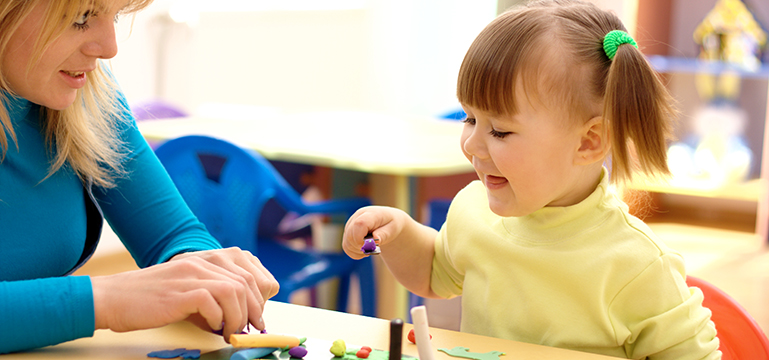Working in partnership with parents and the community

Quick links:
Information about the setting
Berriew Playgroup is an English-medium setting in Berriew in Powys local authority. It is registered for 24 children from the ages of two to eight years. It offers early years education sessions from Monday to Friday from 9.00 am until 11.30 am during school term time. At the time of the inspection, 16 children were receiving funded early years education at the setting.
Context and background to sector-leading practice
Leaders prioritise improving wellbeing and standards for all children. They achieve this by extending their work through sustained and effective partnerships.
Description of nature of strategy or activity identified as sector-leading practice
The strong partnership with parents and carers is vital to the setting’s ethos. Practitioners understand that, to achieve the best outcomes for lifelong learning for children, they need to involve parents fully in what their children learn and experience at the setting. Sharing information is a powerful tool to help achieve this and is done a variety of ways to meet different families’ needs and preferences. For example, practitioners post a blog of each session’s activities and update the useful information board outside the building daily. Practitioners make themselves available before and after sessions for informal chats about children’s progress. Sharing information like this helps parents talk to their children meaningfully about what they have been learning, and provides them with opportunities to follow up on activities if they want to.
Acting on feedback from parent questionnaires, practitioners offer parents termly consultations to hear about their child’s progress. Key workers feed information about children’s achievements into a concise ‘all about me’ report noting progress and next steps for learning. When practitioners share this with parents, they include ideas about how they can support their children at home. For example, they encourage parents to help their children use coins to pay for items when they go shopping, look at shapes and print when they are out and about, talk about what they see, and count steps and household items.
Practitioners give high priority to preparing children for their move to school, supporting them to start school as healthy, confident individuals, ready to learn new things. They take children on progressively long visits to school, including lunchtime visits and visits for significant celebrations such as special assemblies and concerts. With permission from parents, practitioners share information about children’s progress from the foundation phase profile with the reception teacher so that she can plan effectively to build on what they already know. The reception teacher visits the setting frequently. Through professional discussions the setting leader and reception teacher have a shared approach to learning. They attend training together and regularly discuss practice.
Practitioners value the setting’s links with the local community. These have contributed greatly to improving the children’s learning environment as well as enriching children’s learning experiences. For example, members of the local community helped create a sensory garden, built flowerbeds and set up fences to improve the outdoor area. Practitioners support children to develop an awareness of their place in the local community by arranging activities such as regular walks into the local village. Whilst visiting the local church the children introduced themselves to the local vicar. As a result, the local vicar visited the setting to talk to the children about the church, who goes there and about different features of the building. This encouraged children to look closely at the church building, inspired their drawings, and developed their speaking and listening, creative and mark-making skills naturally.
The setting has close links with other partners that enhance children’s learning successfully. The setting worked with a wildlife group, to develop a sense of awe and wonder in the children as they investigated their outdoor environment and used real tools to build bug houses. To promote positive working partnerships with the local community, the setting holds regular open days. Practitioners invite children, parents, community, professionals and practitioners from other settings to join them and see what they do.
What impact has this work had on provision and learners’ standards?
Nearly all children benefit from a rich and exciting curriculum that makes the most of all that the local community offers, and that they contribute to effectively. Parents feel very involved in the life of the setting and are well equipped to support their children at home. Children feel confident about moving on to school. As a result of close partnership working with the reception class teacher, practitioners establish strong foundations for a seamless progression in children’s learning.
How have you shared your good practice?
The setting shares its work with other staff and settings through training events. Other settings within the local authority visit the setting. The local authority advisory teacher shares practice during support visits to other settings and on social media.